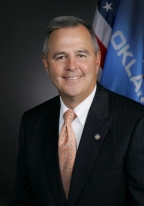In order to provide equal access and equal opportunity to people with diverse abilities, this site has been designed with accessibility in mind. Click here to view
Pro Tem Bingman Statement on Thursday’s vote by the Human Services Commission on NORCE and SORC
 Sen. Brian Bingman
Sen. Brian Bingman
Senate President Pro Tempore Brian Bingman today issued the following statement in response to the Oklahoma Human Services Commission vote to complete Oklahoma’s transition from institutional to community care services.
“Today, the Commission has chosen to ensure Oklahomans living with disabilities receive the highest quality of support, while refusing to let dollars go to the brick-and-mortar maintenance of aging, vacant facilities when those same dollars should go to the direct care of the people Oklahoma serves. I support the Commission and appreciate their hard work—they thoroughly weighed the options, met with families and facility staff, and came to a decision they feel is in the best interest of persons receiving assistance through DDSD. Community care, with its proven results of better outcomes for people living with disabilities, will provide greater flexibility for individuals and families, as well as the most efficient delivery of services.
“I also appreciate the caring, selfless, and hard-working staff at both the NORCE and SORC facilities. They have proven dedicated to the Oklahomans they serve, their families, and to our state. Their continued service as we transition the remaining 2% of persons in institutional care to community based homes is something we should all appreciate.
“Families of the men and women currently transitioning out of institutional care will have Oklahoma’s full support during this time of change. I know the state is committed to helping families in a smooth transition to a high quality community home.
Bingman praised the Governor’s response to Thursday’s vote and offered support for the creation of a blue ribbon panel working toward developing a vision for the future of developmental disabilities services delivery in Oklahoma.
“The most important thing we should do is plan for the future care of Oklahomans living with disabilities—we want what is best for families and individuals and for the state of Oklahoma. I look forward to the recommendations of the panel and the implementation of forward-thinking improvements with positive outcomes for people.”
 Oklahoma Senate
Oklahoma Senate

